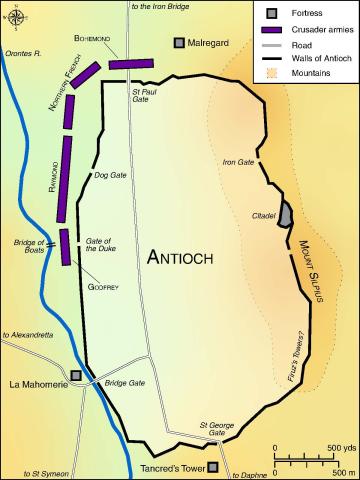Kerbogah tries to retake Antioch
[9.29.8] Ammiralius itaque, quī castellum cūstōdiēbat, vidēns Curbaram et omnēs aliōs fugientēs ē campō ante Francōrum exercitum, magis timuit. Statim vērō cum magnā festīnātiōne petēbat Francōrum vēxilla. Comes igitur Sānctī Egidīī, quī illīc astābat ante castellum, iussit eī portārī suum vēxillum. Ille autem accēpit illud, et dīligenter mīsit in turrim. Statim dīxērunt Longobardī, quī illīc stābant: “Hoc vēxillum nōn est Boamundī.” Interrogāvit ille et dīxit: “Cūius est?” Quī dīxērunt: “Sānctī Egidīī comitis.” Accessit ille, et apprehēnsō vēxillō, reddidit comitī.
notes
(June 1098) The commander of the citadel, witnessing Kerbogah's defeat, asks to surrender to the Franks. Raymond of Toulouse, who was stationed outside the citadel, gives him his banner as a sign of surrender. When crusaders from southern Italy point out that it is not Bohemond's banner, the Turkish commander gives his banner back to Raymond.
petēbat Francōrum vēxilla: asking for "the banners of the Franks" was a request to surrender. The emir had warned Kerbogah that he would surrender if the Turks were defeated (9.21.4)
ille: the emir.
apprehēnsō vēxillō: “having grasped the banner (of the count of St. Gilles).”
vocabulary
vēxillum –ī, n.: flag, standard

